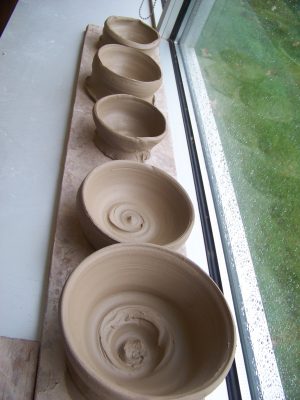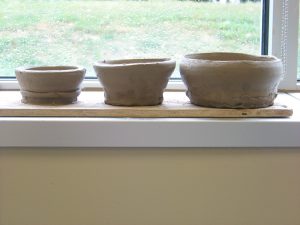 Pottery class, day three. Clay in hair. Clay in eyelashes. Clay on neck. Clay on shirt and jeans. Clay on sandals, tracked inadvertently across studio floor. Clay deep in cuticles. Hands and arms trembling when held out to examine clay deep in cuticles; I’m still trying for less muscular effort and better touch, but kneading, shaping, and centering are still some work. And on the board, a row of bowls with too-thick sides and uneven rims. But now at least I can make the shape. I can make a shape. My adult brain is being literally physically rewired by this deceptively familiar material, earth. I’m learning.
Pottery class, day three. Clay in hair. Clay in eyelashes. Clay on neck. Clay on shirt and jeans. Clay on sandals, tracked inadvertently across studio floor. Clay deep in cuticles. Hands and arms trembling when held out to examine clay deep in cuticles; I’m still trying for less muscular effort and better touch, but kneading, shaping, and centering are still some work. And on the board, a row of bowls with too-thick sides and uneven rims. But now at least I can make the shape. I can make a shape. My adult brain is being literally physically rewired by this deceptively familiar material, earth. I’m learning.
Yet on day two, this relative composure was out of reach. Over and over I centered the clay and pressed my thumbs down, and then watched helplessly as the clay wobbled and the sides unfurled in one big coil. I cussed under my breath. After class, I went to my friend Kristin’s house to pick her up for our planned bike ride and burst through the door in the same mood: bewildered, and bewilderingly angry. “Just remember,” she said, putting her hands on my shoulders and speaking with exaggerated clarity, to pierce the type-A frustration, “this is your SECOND DAY.” I know, I muttered, I know. But I was so pissed off, and more than a little scared by my reaction. I face successes and failures with writing every single day. I know intellectually that you just have to practice, revise and revise, back up and take another run at it. I know that this is a non-problem compared to, like, the rest of reality. But I could not get around this huge stew of simmering humiliation and anger, at myself and at that mute brownish-gray material. Wheels: martyrdom, torture. No wonder.
Maybe all this was heightened not just by the expectations I had for that class but for this weekend: it was my birthday, and the bike ride along the Root River State Trail in southeast Minnesota was to precede an evening of dinner with friends. Yet the bad mood didn’t really start to lift until about mile 10 of a 27-mile ride, swirled in a tiny stream through the beautiful early-fall-smelling day, the famous pies at Whalan, the company of my fabulous friend, the hopes and excitement I have about so many other things going on. I knew I was letting myself spoil my own day but could not rein it in. I have a fucking PhD and I can’t even do this? Failure. Failure!
The next morning — the morning of my 38th birthday — I found a package on my porch: my novel manuscript, returned, with the kindest and most encouraging letter any writer could hope for. But still – no. Four years of work. I got numb, I got weirdly OK with it, I got sad, I got businesslike, I got on the phone with my writing partner. And then I went out to the country to go be in a wedding.
Two breathtakingly talented and surpassingly dear former students of mine were marrying each other in a nineteenth-century Lutheran church at the edge of a cornfield. Wind tossed the wildflowers in the ditches. Their friends played guitar and handed out programs. At the couple’s request I read Shakespeare’s sonnet 116, swallowing hard to keep from tearing up as I looked into their faces at the altar. Let me not to the marriage of true minds admit impediments… All the worry and hurt that had been so loud in my bloodstream receded. At such times, you do get to see the big shapes life is making, and has been making, right under your eyes, all along.
And then we partied till 2 a.m. The dinner and dance were held in a renovated barn originally built in the 1880s, sturdy with hand-hewed wooden beams, lovingly decorated with wildflowers and Chinese lanterns and twinkling lights. There was local beet salad and chicken curry. There was Norwegian pudding and cake. There was wine. There was good talk with the parents who gave these children into the world, and into my world. At random moments, happily awash in the talk and music, I thought about the times I’ve come close to standing at that altar myself, the hopes I still have for love like what I saw in this couple’s eyes, the strength of the love of parents and sisters and brothers and friends, the way the world twists and turns around you as you move through your twenties and into your thirties, the way my plans have and have not worked out, the fact that I would not go backwards by even five minutes, the gratefulness I feel for every single year. Grateful? I am. As bewildering as it can be. As hard as the surfaces of disappointment can feel when you are pressed against them, with what feels like nothing else to touch. As keenly as emotion bites into you, wry and sweet and deep and wrenching, in ways you are glad to have known and in ways that cause incredible pain. I am grateful.
“Your life really has been shaped by your being in the right place at the right time,” my father said. “And for your novel, you are going to find the right place.”
The right place. Lounging on the grass outside the barn, under a giant pale-yellow moon, talking to people who were once my students and are now also friends, it was hard to miss the fact that this day was not only about failure. “I’m still writing,” another former student told me, greeting me with a giant hug. “I’m still writing and performing, because of you. You really pushed me, and I needed that.” Love only endures when it moves like waves, James Kavanaugh wrote, receding and returning gently or passionately,/ Or moving lovingly like the tide / In the moon’s own predictable harmony… These words were part of the ceremony, too, read by one of my other all-time great former students and this couple’s best friends. And they redirected me to the simple fact that life moves this way, too. So does growth. So does love. So does the way we influence each other’s lives, often without knowing it. And so does writing: this novel will look for another home, and in the meantime there are two nonfiction books — and another novel — coming along behind it. Every writer I know has a similar story. Try, fall back a bit, take another run at it. But don’t not try again. Forward, back. Forward. For love, art, full aliveness in this world, which John Keats called the vale of soul-making, there’s no alternative. No matter how expert, or how old, you think you are, and how much it really can hurt. There just isn’t any other way.
So after pottery class today I lingered in the studio with no agenda except messing with clay, throwing some things that maybe would be bowls and maybe would not, but either way would be what writing students and I call, in Anne Lamott’s words, “shitty first drafts.” A quiet, talented high school student, taking this course for college credit, helped me figure out some things I could do differently; he was woodshedding, too, hanging out to work. And then when I set the board with my bowls in the window to dry, I noticed they were accidentally perfect — three sizes all in a line, all slanting up and to the right. Ascending bowls. Hollow vessels, equally exposed, inside and out. But always leaning up.

Thank you for sharing your profoundly spectacular gift for writing and for observation.
My hope that your year is full of lovely moments is partly selfish–I so enjoy reading about them here. XO.
thank you, dear! xxoo